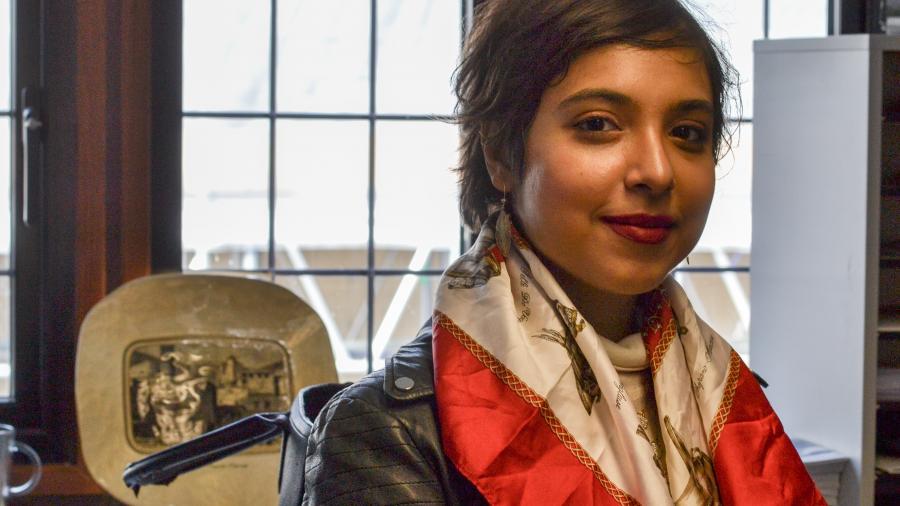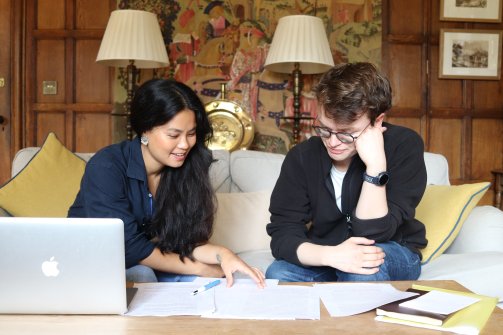The politics of time with Carolyn Smith

The "space archaeologist" studying the very early Universe

The theme of International Women's Day 2022 is Breaking the Bias, so it is fitting that we feature Dr Chandrima Ganguly, Wolfson's Henslow Research Fellow, who works in the extremely male-dominated field of STEM. We spoke to her about her academic life and the women who have inspired her from a young age.

I started out as a cosmologist when I came here. I have always had an abiding love for history - and growing up, I became driven by an urge to find the ultimate origin story. One of my friends once called me a 'space archaeologist' and I think I have used that phrase to describe my work in cosmology ever since. It's an interesting time in my life right now as I am transitioning and changing field.
I have been raised a feminist - whether I always had the words to describe it or not. During my adult years and in my time in a very toxically masculine field of research (and general society), these ideas have solidified and intensified. I have come to realise that I will always be passionate about answering origin stories, but what has consumed me now over the last several years is an urgency to use the skills that I have acquired to contribute towards a socially just and equitable future for us all - and this is through a lens of gender justice.
My research concerns the very early Universe and the question of the Big Bang and whether it actually happened. I have studied a scenario called bouncing cosmologies where the Universe actually contracted in size before approaching the Bounce - which observers today would perceive as a high energy event that we like to call the Big Bang. After the Bounce, the Universe would re-expand into the current phase of expansion that we experience today.
More recently I have become interested in using Machine Learning to augment existing observational data or create model-independent forecasting data for late time tests, to see whether General Relativity is still a valid theory of gravity at late times.
Given my interest in social and gender justice, I have been pursuing the decolonising science programme for a year or so now. Decolonising is such a catch-all term now, that it is hard to settle on a single definition. But I see these disparate streams of my work evolve in trying to use Science and Technology to help create a technical feminist future.
If at the end of my life, I see that my work has contributed to allowing people, regardless of who they are, and where they came from or how they were born, to have a choice in deciding how to live their lives, I will consider myself successful.
I came here as a Master's student from India. I had gotten the admission offer and had no funding. The fees for overseas students is significantly higher compared to British and EU students. The number was galling and only when I got a scholarship from the Inlaks Foundation a few months later was I able to conceptualise actually coming here. After my PhD, I was in the US for a bit, before returning here for my current fellowship. I want to reflect on the difference Cambridge meant to me at both times. The first time round, it felt like a dream come true - a magical place, where a lot of the Science that I had studied had been thought of and conceptualised. The second time I came back, it felt a lot like coming back to my intellectual home.
My grandmother and mother were the first people to inspire me. My mother taught me maths from a very young age, and my grandmother taught me languages, history and philosophy as bed-time stories. They were both the first people to tell me that even if society told me differently, standing up for myself and the beliefs I care about was the most important thing in life.
I have also been inspired by my friends, who have taught me to be kinder, taught me resilience when everything seemed dark, and also given me a family that spans continents and time. It has been hard over the pandemic to see them, but I hope to be able to travel soon to see them, after I have a bit of certainty with my job situation.
My mentor, Anne Davies and Jane Clarke are also women who I have looked to as real life examples of what it might mean to live a life in academic Science, or that it is never too late to change your mind in which career you choose for yourself.
And finally, even though they do/did not know I existed, I have been inspired by Audre Lorde, Chanda Prescod-Weinstein, Gayatri Chakravorty Spivak, Angela Davis and Ruth Bader Ginsburg.







